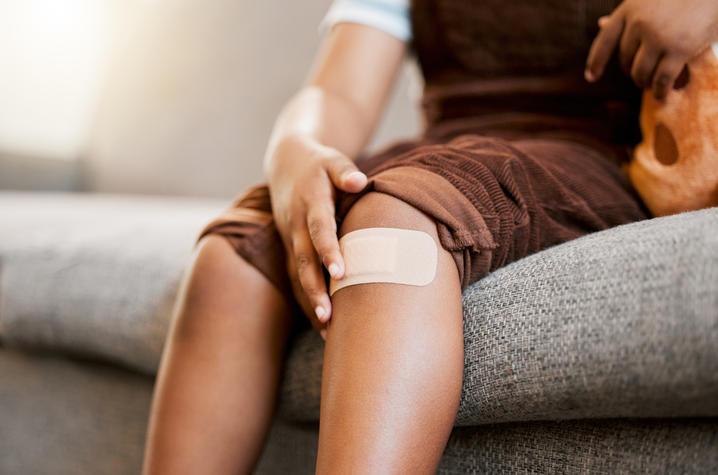Treat minor cuts at home, avoid infections with these tips

The University of Kentucky Public Relations and Strategic Communications Office provides a weekly health column available for use and reprint by news media. This week's column is by Julie Elder, certified wound/ostomy nurse and clinical nurse specialist at UK Healthcare.
LEXINGTON, Ky. (Aug. 7, 2024) - Minor cuts and scrapes are common and can usually be treated and monitored at home. However, there are ways to promote healing and signs to look for that could signal infection and need further medical attention.
It’s important to note that deeper cuts or more severe punctures and wounds may need to be evaluated by a health care provider. If a skin injury is present for longer than 30 days, it should also be evaluated by a health care provider.
Treating minor cuts and scrapes at home
Gently clean the injury with mild soap and water for routine care. Keep the area covered with a light bandage to protect it from dirt and bacteria. Most minor cuts caused by house pets can be treated the same. In any case, it is important to monitor for infection.
Signs of infection
Common symptoms of an infected cut or scrape include increased redness around the injury, pain and drainage. These changes could indicate the area is becoming infected and needs to be seen by a health care provider.
Common questions about at-home treatment
- Does rubbing alcohol or hydrogen peroxide clean a cut?
Initially, cleaning with alcohol or hydrogen peroxide after an injury can rinse away debris and bacteria. Continuing to use alcohol or hydrogen peroxide can slow wound healing. After the first cleaning, it is recommended to only use a mild soap and water to continue the care.
- Does antibiotic ointment help heal cuts?
Many scrapes or cuts do not need an antibiotic ointment to heal. Vaseline/petroleum jelly is just as effective for healing wounds. Health care providers are moving away from recommending Neosporin or other antibiotic ointments. Repeated use can cause the development of an allergy or skin sensitivity.
- Does keeping a cut completely dry help it heal?
Cuts and scrapes heal faster if it has a little bit of moisture to the injury. A layer of Vaseline/petroleum jelly and a light bandage is a good dressing for a wound.
- Is it better to keep a cut open and exposed to the air to help it heal?
A wound heals faster if it is covered. It is best to dress a wound with a layer of Vaseline/petroleum jelly and a light bandage.
UK HealthCare is the hospitals and clinics of the University of Kentucky. But it is so much more. It is more than 10,000 dedicated health care professionals committed to providing advanced subspecialty care for the most critically injured and ill patients from the Commonwealth and beyond. It also is the home of the state’s only National Cancer Institute (NCI)-designated Comprehensive Cancer Center, a Level IV Neonatal Intensive Care Unit that cares for the tiniest and sickest newborns and the region’s only Level 1 trauma center.
As an academic research institution, we are continuously pursuing the next generation of cures, treatments, protocols and policies. Our discoveries have the potential to change what’s medically possible within our lifetimes. Our educators and thought leaders are transforming the health care landscape as our six health professions colleges teach the next generation of doctors, nurses, pharmacists and other health care professionals, spreading the highest standards of care. UK HealthCare is the power of advanced medicine committed to creating a healthier Kentucky, now and for generations to come.




